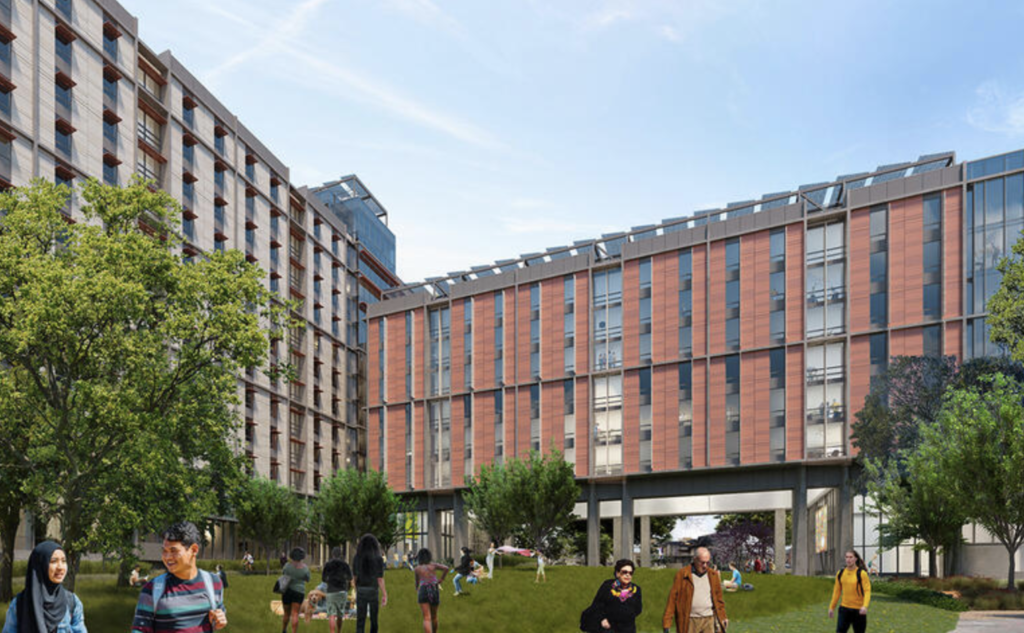The battle over People’s Park has been raging since I was in sixth grade, and we could spend a huge amount of time talking about the role of the three-acre lot in the history of Berkeley. It’s been a point of contention representing so much and so many issues, and it’s back in the news now that UC Berkeley once again is trying to build a dorm on the site as part of a much larger campus expansion plan.
And this week, the Court of Appeal for the First Circuit of California issued a ruling on what started out as a technical legal issue around the project but has now, potentially, changed the way environmental law applies to cities in Northern California.

Specifically, the tentative court ruling holds that gentrification and displacement are issues that have to be analyzed under the California Environmental Quality Act.
That would, among other things, justify the Board of Supes decision on 469 Stevenson Street and force the city and developers to do an entirely new type of analysis before they put luxury housing projects in vulnerable communities.
This isn’t final: The opinion is still in draft form, and won’t be finalized until after the court hears oral arguments Jan. 12. Even if the court sticks to its tentative ruling, the Supreme Court could take up the case.
But if it holds, development-friendly folks are already freaking out. From today’s Business Times:
If the appellate court draft ruling stands, however, it will represent a significant expansion of CEQA, according to Chris Elmendorf, a professor at the University of California, Davis School of Law. The ruling represents the first time that an appellate court has concluded that a project’s potential social impacts — whether or not it might contribute to the gentrification of a given neighborhood, for example — fall under the purview of CEQA, per Elmendorf.
“If you build a nice park or improve the bus service in a disadvantaged neighborhood, that neighborhood becomes more attractive, and that increases demand for housing,” he said. “Under the logic of this opinion, any time you do that in an area where there is some risk of displacement, which is all of California, you’ll have to mitigate the potential displacement effects of your program.”
More:
Via the precedent that could be set by the appellate court ruling, Elmendorf told me, the Board of Supervisors would be justified in its Stevenson vote.
“It’s going to be binding law within the first district court of appeal, which is basically all of the Bay Area,” he said.
Wow. Terrifying: The court says when a project could lead to significant displacement of existing residents and businesses, the government agency overseeing it has to consider and analyze that impact.
This is not a huge step: In a 1985 case in Inyo County, an appeals court ruled that a CEQA review should take into account, for example, whether a new shopping mall outside of a city might drive existing downtown stores out of business, leading to “an eventual physical deterioration of the downtown area.”
But the People’s Park case goes further. In essence, the court notes that the development plan UC Berkeley is proposing, which includes new academic space, would bring at least 8,000 new people to the campus area and only 1,100 units of housing at the park site.
“The EIR itself acknowledges that existing residents may be displaced due to the failure of housing stock to keep pace with population and commensurately rising housing costs,” the ruling says.
UC argues that it doesn’t matter: Under CEQA, gentrification is a social and economic problem, not an environmental issue. That’s what developers and public officials have argued for decades, and is part of what the 469 Stevenson fight was about.
The court agreed—to a point. But where economic changes caused by displacement can lead to other changes—“where there is substantial evidence a project will lead to substantial adverse effects on humans”— an environmental impact report can’t ignore them.
And displacement, including the potential for homelessness, counts.
This doesn’t mean the UC expansion plan is dead, or even delayed for long. The university can rewrite sections of the EIR, acknowledge that it will displace existing residents, offer some alternatives (and reject them) and the Board of Regents can approve a new version.
The ruling ignores the commercial aspects of gentrification, the displacement of local community-serving merchants to make way for businesses that can pay much higher rent and the resulting transformation of neighborhoods.
But it’s a potentially giant step forward, and acknowledgement that displacement is often a part of growth and that cities and counties can’t just ignore it.




